Colorado Rockies: The franchise all-time bracket

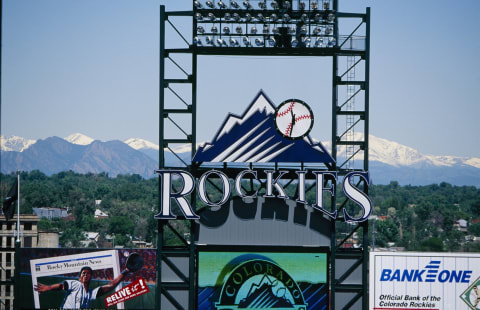
The best teams in Colorado Rockies history are all… hitterish. Let’s take a closer look.
Since the franchise’s founding in 1993, the Colorado Rockies have been known for one thing. Unfortunately, it hasn’t been winning.
In the 27 seasons of its existence, the Rockies have led the National League in batting 15 times. Yet that steady attack has produced only one World Series appearance and just five post-season experiences. No Colorado team has ever won an NL West championship.
More from Call to the Pen
- Philadelphia Phillies, ready for a stretch run, bomb St. Louis Cardinals
- Philadelphia Phillies: The 4 players on the franchise’s Mount Rushmore
- Boston Red Sox fans should be upset over Mookie Betts’ comment
- Analyzing the Boston Red Sox trade for Dave Henderson and Spike Owen
- 2023 MLB postseason likely to have a strange look without Yankees, Red Sox, Cardinals
Even at altitude, hitting only takes a team so far. It still has to pitch,
By performance, the most successful Rockies team was the 2007 club, which made the wild card and rolled 7-0 through the National League playoffs before losing to Boston in a four-game World Series.
It’s also the only Colorado team to reach the NLCS round. But the Rockies haven’t had many chances; the lifetime franchise record is more than 200 games under .500.
Aside from 2007, the other Colorado post-season entries are the 1995, 2009, 2017 and 2018 clubs…so they’re all in. But that still leaves three spots to fill in our eight-team bracket.
The cut won’t be difficult because only four other Rockies teams have even played .500 ball. Of those, the three best records belong to the1996, 1997, and 2010 teams, so they are the choices.
Aside from one Colorado-specific change, the format is identical to previous bracket challenges. Each matchup in the tournament is decided based on seven criteria. You can think of each as a ‘game,’ the winner of four games advancing. The seven criteria are:
- Game 1: Regular season winning percentage.
- Game 2: Post-season winning percentage
- Game 3: Team OPS+
- Game 4: Team ERA+
- Game 5 (if necessary): Team WAR
- Game 6 (if necessary: Fielding percentage above the league average for the season in question.
- Game 7 (if necessary): The normal standard for Game 7 is Hall of Famers or likely future Hall of Famers. But the Rockies are such a new franchise that counting immortals isn’t likely to produce a result. So for Colorado, we’re substituting All-Stars as the deciding criteria.
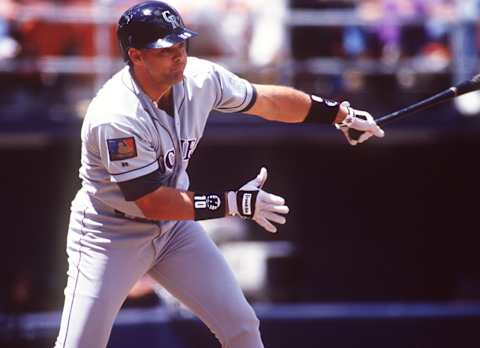
Colorado Rockies: The All-Time Bracket
No. 1 vs 8 seed
The 2007 Colorado Rockies enter this challenge as the prohibitive favorite. Not only did they advance farthest in post-season, but they also had one of the best regular-season records in franchise history and they possessed a rarity in Denver, competent pitching.
Jeff Francis was 17-9 in 34 starts, and Aaron Cook delivered 25 credible starts.
At bat, the Rockies featured three stars. First baseman Todd Helton batted .320 with 91 RBIs, shortstop Troy Tulowitzki hit .291 with 99 RBIs, and outfielder Matt Holliday led the team at .340 with 36 home runs and 137 RBIs. Holliday led the league in both average and RBIs, yet managed to lose the MVP that season to Phillies shortstop Jimmy Rollins.
The 1996 Rockies failed to reach post-season, finishing eight games behind division champion San Diego. But manager Don Baylor had a good ballclub led by first baseman Andres Galarraga (.304, 47 homers, 150 RBI), and outfielders Ellis Burks and Dante Bichette. Burks hit .344 with 40 homers and 128 RBIs, Bichette batted .313 with 31 and 141.
Given that level of production, you will doubtless deduce that pitching was a problem. It was. Kevin Ritz was 17-11 despite a 5.28 ERA, but he was the only starter above .500.
Related Story. Houston Astros: The Franchise All-Time Bracket. light
Game 1: The 2007 team had a 90-73 record and .552 percentage. The 1996 Rockies won just 83 games, a .512 percentage.
Game 2: Since the 1996 team did not play a post-season game, this one is forfeited to 2007.
Game 3: The 2007 Rockies reached the World Series despite a mediocre 98 OPS+…which, if you’re wondering, is adjusted for both seasonal variations and home field. The 1996 team beat that, although by only one point, at 99.
Game 4: The 2007 Rockies presented one of the better pitching staffs in franchise history, with a 112 ERA+. The 1996 club only got to 93.
Game 5: The 2007 Rockies accumulated 41.4 WAR. The 1996 tea stopped at 28.7.
Result: 2007 in five games
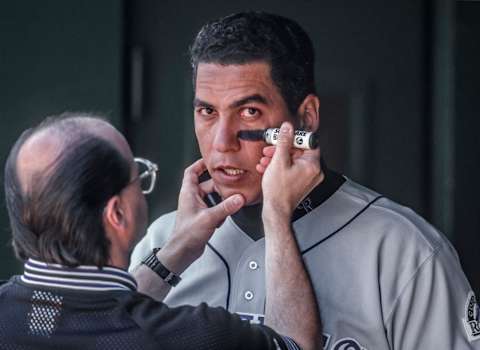
Colorado Rockies: The All-Time Bracket
No. 4 vs. 5 seed
The 2017 Rockies only finished third in the NL West, but qualified for the wild card game, which they lost to the Arizona Diamondbacks. As usual, there was hitting.
Third baseman Nolan Arenado batted .309 with 37 homers and 130 RBIs. Outfielder Charlie Blackmon hit .331 with 37 homers and 104 RBIs, while infielder D J LeMahieu and outfielder Gerardo Parra also topped .300.
The pitching staff had four double-digit winners but no standouts, German Marques leading with an 11-7 record in 29 starts. Greg Holland saved 41 games.
The 1995 team reached post-season play in only the franchise’s third season, finishing just one game behind Los Angeles in the NL West. They lost a four-game division series to the soon-to-be Atlanta Braves.
Bichette, fellow outfielder Larry Walker, second baseman Eric Young, and third baseman Vinny Castilla all topped .300, and Bichette added 40 homers plus 128 RBIs. He too was second in MVP voting, in Bichette’s case behind Reds shortstop Barry Larkin.
The pitching was what Rockies fans would come to expect. Kevin Ritz led with an 11-11 record in 28 starts, and nobody else stood out. But it was good enough to allow the offense to operate.
Related Story. Seattle Mariners: The franchise all-time bracket. light
Game 1: The 2017 Rockies were 87-75, a .537 percentage that was one game better than 1995’s 77-67 .535.
Game 2: In postseason play the 1995 team lost a four-game division series. That’s good enough to beat the 2017 team, which lost its only post-season game.
Game 3: The 1995 Rockies had just a 94 team OPS+. That may not sound good, but it was four points better than the 2017 team’s 90 OPS+.
Game 4: The 1995 Rockies managed a 108mERA+. But the 2017 team had a 112 ERA+, evening this series at two games each.
Game 5: The 2017 club produced a 39.2 WAR. The 1995 club only managed a 34.9 WAR.
Game 6: The 2017 Rockies fielded .987, two points better than that season’s league average. In 1995 the Rockies fielded 1.981, just one point better than the league average.
Result: 2017 in six games
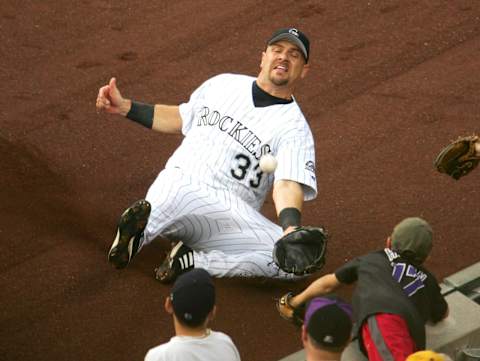
Colorado Rockies: The All-Time Bracket
No. 2 vs. 7 seed
The 2009 Colorado Rockies finished three games behind the Dodgers in the NL West, then as wild card lost a division series to the Philadelphia Phillies.
Helton was the undisputed team leader with a .325 batting average and 86 RBIs. But Tulowitzki batted .297, hit 32 homers and drove home 92 runs.
Ubaldo Jimenez, Jorge De La Rosa, and Jason Marquis combined for 46 victories in 98 starts encompassing nearly 620 innings. Huston Street saved 35 games.
The 1997 team was an aging version of the 1995 club, but it retained punch. Galarraga batted .318 with 41 homers and 140 RBIs, Walker hit .366 with 49 homers and 130 RBIs, and Bichette and Castilla both also topped .300. Walker was named the league’s Most Valuable Player.
Not a single Rockies pitcher won as many as 10 games all season, and the staff’s 5.25 ERA ranked last in the league.
Related Story. Los Angeles Angels: The franchise all-time bracket. light
Game 1: The 2009 Rockies were 92-70 in the regular season, a .568 percentage. In 1997 the team was 83-79, only a .512 percentage.
Game 2: The 1997 team did not play a post-season game, forfeiting a 2-0 advantage to 2009.
Game 3: The 1997 team did produce a league-average 100 OPS+. That was good enough to surpass the 2009 team’s 96 OPS+.
Game 4: The 1997 team’s 99 ERA+ did not match up to the 2009 team’s 112 ERA+.
Game 5: In 2009, the Rockies amassed 39.7 WAR. That’s not great, but it’s good enough to beat 1997’s 34.0.
Result: 2009 in five games
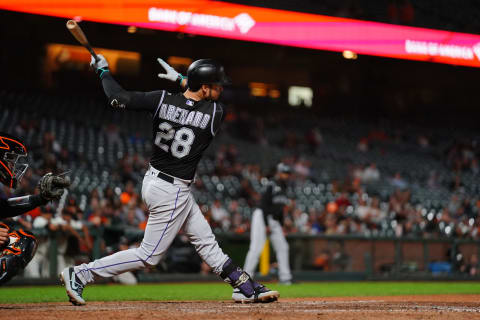
Colorado Rockies: The All-Time Bracket
No. 3 vs. 6 seed
The 2018 Colorado Rockies qualified for the second NL wild card, beat the Chicago Cubs and then went out in three games to the Milwaukee Brewers in the division series.
This was a rare Rockies team featuring no .300 hitting regulars. But Arenado batted .297 with 38 home runs and 110 RBIs, and shortstop Trevor Story hit .291 with 37 homers and 108 RBIs. They were clearly the team leaders.
Kyle Freeland enjoyed a breakout season with a 17-07 record and 2.85 ERA, almost unheard-of for pitching whose home field was Coors. German Marquez added a 14-11 record and 3.77 ERA in 33 starts.
The 2010 team finished third in the NL West behind manager Jim Tracy. Tulowitzki was the star, with a .315 average, 27 home runs and 95 RBIs.
Ubaldo Jimenez was 19-8 in 33 starts with a 2.88 ERA to lead the staff.
Related Story. Oakland Athletics: The franchise all-time bracket. light
Game 1: The 2018 team had a 91-72 regular-season record, a .558 percentage. The 2010 team came in 83-79, .512, eight games worse.
Game 2: The 2010 team did not play a post-season game giving this one to 2018 by forfeit.
Game 3: The 2010 team’s 92 OPS+ was actually two points higher than 2018’s 90.
Game 4: The 2010 club had a 112 staff ERA+. The 2018 Rockies only produced a 109 ERA+. This series is even at 2 games each.
Game 5: The 2010 Rockies accumulated 36.7 WAR. In 2018 the Rockies only reached 34.9 WAR.
Game 6: In 2018 Colorado fielded .988, four points better than the league average. In 2010 the Rockies fielded .984, just one point better than the league average.
Game 7: The 2018 Rocks were represented by three All-Stars: Story, Arenado and Charlie Blackmon. The 2010 team had only two, Jimenez and Tulowitzki.
Result: 2018 in seven games
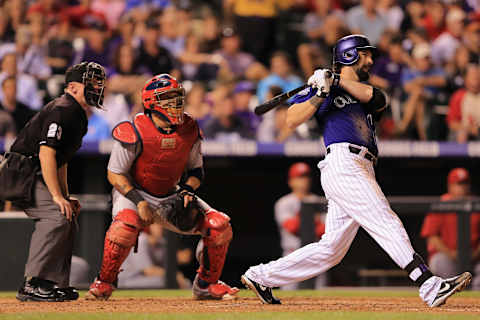
Colorado Rockies: The All-Time Bracket
Semi-finals
Four of the franchise’s five post-season teams – representing two eras — have advanced.
2007 vs. 2017
Game 1: The 2007 Rockies’ .552 regular-season percentage was two and one-half games better than 2017’s .537 percentage.
Game 2: In 2007, the club had a .636 post-season percentage based on sweeping the division and championship series and being swept in the World Series. The 2017 team lost its only post-season game.
Game 3: The 2007 champions only reached a 98 team OPS+. But in 2017, the Rockies failed to reach even that, finishing with a 90 OPS+.
Game 4: The 2017 team had a 12 staff ERA+. In 2007, the staff ERA+ was also 112. That took this game to a tie-breaker, best individual ERA+. In 2007 Aaron Cook led the staff at 117. But in 2017, Jon Gray and Kyle Freeland both beat that, at 138 and 123 respectively.
Game 5: The 2007 team’s 41.4 WAR is about two points better than 2017’s 39.2.
Result: 2007 in five games
Related Story. Detroit Tigers: The Franchise All-Time Bracket. light
2009 vs. 2018
Game 1: The 2009 Rockies had a .568 regular-season percentage, one and one-half games better than 2018’s .558.
Game 2: The 2018 Rockies won only one of four postseason games. But that precisely matches the 2009 team’s post-season record. This game is declared a tie.
Game 3: The 2009 Rockies had a 96 OPS+. In 2018, the Rockies only got to a 90 OPS+.
Game 4: The 2018 Rockies produced a 109 staff ERA+. The 2009 Rockies beat that with a 112 ERA+.
Game 5: The 2009 team amassed a 39.7 WAR, about three points better than 2018’s 34.9 WAR.
Result: 2009 in five games, one tie
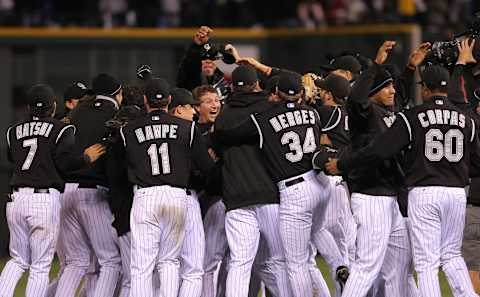
Colorado Rockies: The All-Time Bracket
Championship
In Colorado, the contest comes down to the 2007 National League champions vs. a 2009 team that is very similar, just slightly less successful.
More from Colorado Rockies
- Versatile Michael Toglia shines in second season for Colorado Rockies
- Matt Koch gamble pays dividends for Colorado Rockies
- Colorado Rockies: Ty Blach lives his faith despite series of challenges
- How pitching guru Brent Strom would fix the Colorado Rockies at Coors Field
- Ezequiel Tovar is beginning to meet Colorado Rockies’ high rookie expectations
Game 1: The 2007 champions had a .552 regular-season percentage. The 2009 team may not have made the World Series, but they actually played two and one-half games better during the regular season, at .568.
Game 2: The 2009 team only produced a .250 post-season average, not up to the standard set by the 2007 team’s .636 percentage.
Game 3: In 2007 the Rockies had a 98 OPS+. The 2009 Rockies failed to match that, only reaching 96.
Game 4: Both teams produced a 112 ERA+. So we need another tie-breaker, and this one goes to Ubaldo Jimenez, who had a 136 OPS + for the 2009 team. This series is tied at 2 each.
Game 5: The 2007 Rockies had a 41.4 WAR, a point and a half better than 2009’s 39.7 WAR.
Game 6: In 2009, the Rockies fielded .986, two points better than the league average. The 2007 team fielded .989, and that was a full six points better than the league average.
Result: 2007 in six games
dark. Next. Dodgers: the talking heads would be talking
In beating the1996, 2017 and 2009 Rockies, the 2007 team was never extended to a seventh game. That team produced two All-Stars, Brian Fuentes and Matt Holliday. The team has not yet produced a Hall of Famer, but that might change. Todd Helton finished 15th in his first year of eligibility in 2019 with 16.5 percent. He’s no sure thing, but he has a chance.